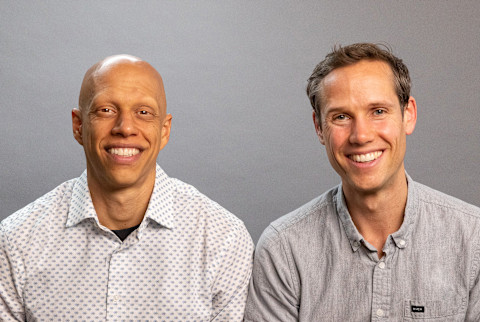How These Diabetes Experts Stabilized Their Blood Sugar With Food Alone

The founders of Mastering Diabetes, Cyrus Khambatta, Ph.D., and Robby Barbaro, MPH, had similar paths with their type 1 diabetes diagnoses: Both were relatively young (Khambatta was in his 20s while Barbaro was just 12), both experienced the tell-all symptoms (feeling extremely thirsty, frequent trips to the bathroom), and they both heeded the general advice of medical professionals, which was to eat a low-carb diet.
But the similarities don't stop there. Both experts were able to discover how to stabilize their blood sugar and actually reverse their insulin resistance.
The secret? Nothing fancy, just a plant-based, high-carb diet. "I learned how to take better care of myself and how I can reduce my chances for long-term complications," Barbaro tells me on this week's episode of the mindbodygreen podcast.
Here, we've highlighted why Khambatta and Barbaro are such big fans of a plant-based diet and how this eating plan helped them stabilize their blood sugar. In the case of these two diabetes experts, food truly is medicine.
They began with inspiration from the same nutrition professional.
In what seems like a crazy coincidence, both Khambatta and Barbaro were inspired by Doug Graham, D.C., a health and nutrition author recognized as one of the fathers of the raw food movement.
Khambatta came across this raw food king, and he ended up accompanying Graham on a seven-day retreat. "He took me under his wing," Khambatta recalls. "He showed me how to eat a diet with lots of fruits and lots of vegetables. In that seven day period, my blood glucose fell so rapidly that I had to back off on the amount of insulin I was giving myself."
Years later, and Barbaro felt that same inspiration from Graham through a podcast. "He talked about how you can eat fruits and vegetables that can actually help you cleanse your body. I thought, 'I'm going to give this a shot,'" Barbaro says.
Lo and behold, Barbaro experienced a blood glucose decrease as well. "I found I was needing a physiologically normal amount of insulin, the same amount my pancreas would secrete if it didn't have damage to it itself."
They both dove into the research and found what was there.
Both Khambatta and Barbaro were so curious about their anecdotal results on a carb-rich plant-based diet that they wanted to find any existing research about the topic. And, as it turns out, there are studies that back up their results: "What I've experienced is actually something that's been documented for many years," Khambatta explains.
According to Khambatta, there's years upon years of evidence-based research that shows how nutritious, whole carbs can help control blood glucose and reverse insulin resistance, arguably two of the most important factors for managing type 1 diabetes.
They follow a plant-based, high-carbohydrate diet.
"I was doing the exact opposite of a traditional diabetes model—I was eating more carbohydrate energy than I'd ever eaten before," Khambatta explains. "I was eating 600 grams of carbohydrate energy per day, and my insulin use got cut by 35 to 40%."
"I started eating lots of fruits and vegetables," Barbaro adds. "I increased my carbohydrate content and had a 22-to-1 carbohydrate-insulin ratio." In case you aren't familiar with the technical language, that means his insulin sensitivity changed by 600%.
It's important to note the distinction between whole carbs and processed, refined carbs here (it's always good to have a reminder!). Barbaro and Khambatta are partial to the four main carbohydrate categories: fruits, starchy vegetables, beans and legumes, and whole grains.
"The type of carbohydrate you eat absolutely matters," Khambatta says. That said, these experts are encouraging you to eat sweet potatoes, not french fries.
There is some nuance (Khambatta is partial to chickpeas and lacinato kale, while Barbaro loves his sweet potatoes), but the two agree that carbs are essential for long-term health. In terms of their favorite carbs to have on their plates, they agree on fruit as the No. 1 option. "Bananas, mangoes, papayas, pears, jackfruit, you name it. That's our personal favorite, no question."
Even if you don't necessarily suffer from type 1 diabetes, these whole carbohydrate-rich foods are packed with vitamins, fiber, and phytochemicals that increase your overall nutrient density—something we all ultimately want, no?
